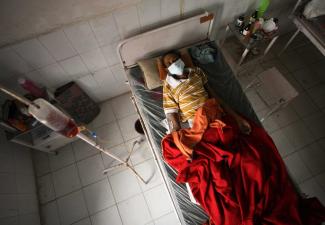Coronavirus
How coronavirus is affecting HIV/AIDS, TB and Malaria
 Ritesh Shukla/picture-alliance/NurPhoto
TB patient in Ahmedabad, India.
Ritesh Shukla/picture-alliance/NurPhoto
TB patient in Ahmedabad, India.
When the Global Fund was established in 2002, HIV/AIDS, tuberculosis and malaria had an iron grip on the world. The Fund’s purpose is to fight these three infectious diseases. So far, the programmes it supports have saved 44 million lives, according to the Fund’s recently published results report.
The Fund claims that there have been great advances against HIV/AIDS. In countries where it supports health initiatives, AIDS-related deaths have decreased by two thirds since 2002. Globally, new HIV infections went down 31 % from 2010 to 2020. In the same time span, the number of patients on antiretroviral drugs rose by almost 20 million. In 2020, the Fund reports:
- 84 % of HIV-positive people had been diagnosed,
- 87 % of the diagnosed patients were receiving treatment, and
- 90 % of the treated patients were able to lead a relatively normal life.
The 90-90-90 target set by the UN General Assembly in 2016 was thus almost achieved. The Fund emphasises, however, that the disease still poses a serious threat to vulnerable groups, including young women, drug users and sex workers.
For the first time in its history, the Global Fund reports setbacks. The amount of HIV-tests declined by 22 % in 2020, and Fund-supported programmes reached 11 % fewer persons. The Fund states that Covid-19 was the reason.
Of all infectious diseases, Covid-19 caused the most fatalities worldwide last year. According to the report, tuberculosis is now in the second place. Since 2002, the number of TB deaths has decreased by 28 % in the countries where the Fund supports medical efforts. The number of new infections went down by four percent. The Fund admits that the aspiration to reduce the number of TB deaths by 35 % from 2015 to 2020 was not fulfilled. It had only declined by 15 % in 2019, and more recent data are not available yet.
Confusing symptoms
According to the results report, Covid-19 and tuberculosis are easily confused because some symptoms are the same. Many people with TB symptoms like cough or fever were not diagnosed last year. They were not put on treatment accordingly.
Covid-19 is thus threatening the progress made in detecting TB infections, the authors warn. From 2013 to 2019, the share of TB-infected people who were unaware of their illness fell by 17 %. The Fund insists this decline must continue in spite of the Covid-19 because drug-resistant TB infections are very dangerous (see Roli Mahajan’s contribution in the Focus section of D+C/E+Z e-Paper 2020/03). Cases must therefore be detected. Of all people dying of multi-resistant pathogens, one third are TB patients, according to the Fund. On the upside, the rollout of preventive treatment against TB went well last year. The Fund reports it reached 13 % more children.
The Fund considers the progress against malaria to be “one of humanity’s most significant public health successes”. From 2002 to 2019, malaria deaths decreased by 45 % in countries supported by the Fund. However, microbial resistance against Artemisinin, the most commonly used malaria drug, is increasing and mosquitos are becoming less susceptible to insecticides.
The Fund argues that these are the reasons why the battle against malaria has been stalling since 2017. Nonetheless, the eradication of the disease seems closer than ever before. In February 2021, the World Health Organization (WHO) declared El Salvador to be malaria-free. Progress was also made in the prophylactic malaria treatment of children.
The Covid-19 pandemic, however, has several impacts on health systems, including long delivery times for medical equipment. The Fund reports that malaria-prevention programmes have been obstructed. Moreover, social distancing makes large-scale awareness raising impossible. The Global Fund explains that the fight against malaria was not affected as badly by the pandemic as the fights against HIV/AIDS and TB.
Link
Global Fund: Results report 2021.
https://www.theglobalfund.org/en/results/
Aenne Frankenberger is a student of English and business administration at the Justus-Liebig-University in Giessen. She is currently an intern in E+Z/D+C’s editorial office.
euz.editor@dandc.eu

